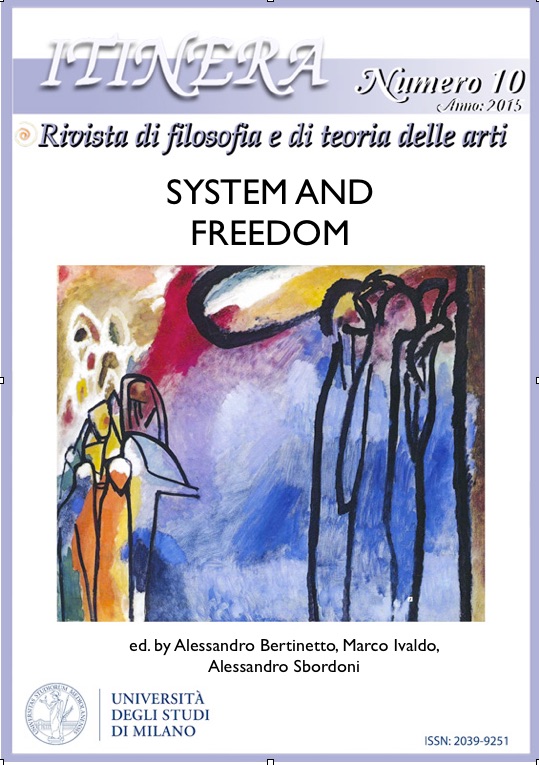Interpretazione dialettica e fantasia esatta. Sul sistema in Adorno
DOI:
https://doi.org/10.13130/2039-9251/6656Abstract
Adorno’s negative dialectics wants to free the thought from the dictates of the system, taking position against the illusion to grasp the essence of reality by logic. Against that false idea of totality, Adorno devises a philosophy of fragment, a logic of disgregation that presupposes a different concept of totality: a fragmented, scattered and conflicting wholeness. The anti systematic thinking of Adorno is configured, however, as a systematic rejection of any systematic formulation: philosophy can at most claiming a pretension to truth by the practice of interpretation. A dialectic configuration of fragments of totality is at stake here: so, the arrangement of such fragments can both produce an image of reality endowed with meaning and also unfold through heterogeneous combinations that are not definitive, but always renewable from time to time. In Adorno’s reflection are so expressed two different instances which are complementary at the same time: on the one hand it represents the critical and negative element against the system and its hybris, on the other hand it expresses the need of the thought to go beyond and overcome that fragmentation, showing how the need of unity of the system is a need of the thought in itself.
Downloads
Riferimenti bibliografici
ADORNO, Theodor Wiesengrund, L’attualita della filosofia. Tesi all’origine del pensiero critico, a cura di M. Farina, Mimesis, Milano-Udine 2006.
–, Dialettica Negativa (1966), Einaudi, Torino 2004.
–, Minima Moralia (1951), Einaudi, Torino 2005.
Horkheimer, Max, Adorno, Theodor Wiesengrund, Dialettica dell’illuminismo (1947), Einaudi, Torino 1997.
BENJAMIN, Walter, Sul concetto di storia (1950), Einaudi, Torino 1997.
–, Il dramma barocco tedesco (1999), Einaudi, Torino 1999.
CORTELLA, Lucio, Una dialettica nella finitezza. Adorno e il programma di una “Dialettica negativa”, Meltemi, Roma 2006.
DE MARTINO, Ernesto, Il mondo magico (1948), Bollati Boringhieri, Torino 2007.
HABERMAS, Jürgen, L’intrico di mito e illuminismo: Horkheimer e Adorno, in Il discorso filosofico della modernita. Dodici lezioni (1985), Laterza, Roma-Bari 1997.
HEGEL, Georg Wilhelm Friedrich, Fenomenologia dello spirito, Bompiani, Milano 1995.
–, Scienza della logica, Laterza, Roma-Bari 2008.
HEIDEGGER, Martin, Essere e tempo (1927), Longanesi, Milano 2005.
JAMESON, Fredric, Tardomarxismo: Adorno, il postmoderno e la dialettica (1990), Manifestolibri, Roma 1994.
LUKÁCS, György. Storia e coscienza di classe (1923), SugarCo, Milano 1997.
MARCUSE, Herbert, L’ontologia di Hegel e la fondazione di una teoria della storicità (1932), La Nuova Italia, Firenze 1969.
MARX, Karl, L’ideologia tedesca (1932) Bompiani, Milano 2011.
MÖRCHEN, Hermann, Adorno und Heidegger, Klett-Cotta, Stuttgart 1981.
PETRUCCIANI, Stefano, Il mitico nel moderno: figure del feticismo in Adorno, in Figure del feticismo, Einaudi, Torino 2001.
SCHMUCKER, Joseph, Adorno. Logik des Zerfalls. Frommann-Holzboog, Stuttgart 1977.
VON WUSSOW, Philipp, Logik der Deutung. Adorno und die Philosophie., Königshausen & Neumann, Würzburg 2007.
WELLMER, Albrecht, Zur Dialektik von Moderne und Postmoderne. Vernunftkritik nach Adorno, Suhrkamp, Frankfurt am Main 1985.
Dowloads
Pubblicato
Come citare
Fascicolo
Sezione
Licenza
Gli autori che pubblicano su questa rivista accettano le seguenti condizioni:
1. Gli autori mantengono i diritti sulla loro opera e cedono alla rivista il diritto di prima pubblicazione dell'opera, contemporaneamente licenziata sotto una Licenza Creative Commons - Attribuzione - Condividi allo stesso modo 4.0 internazionale che permette ad altri di condividere l'opera indicando la paternità intellettuale e la prima pubblicazione su questa rivista.
2. Gli autori possono aderire ad altri accordi di licenza non esclusiva per la distribuzione della versione dell'opera pubblicata (es. depositarla in un archivio istituzionale o pubblicarla in una monografia), a patto di indicare che la prima pubblicazione è avvenuta su questa rivista.
3. Gli autori possono diffondere la loro opera online (es. in repository istituzionali o nel loro sito web) prima e durante il processo di submission, poiché può portare a scambi produttivi e aumentare le citazioni dell'opera pubblicata (Vedi The Effect of Open Access).





